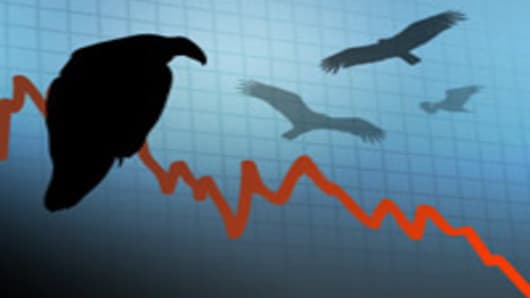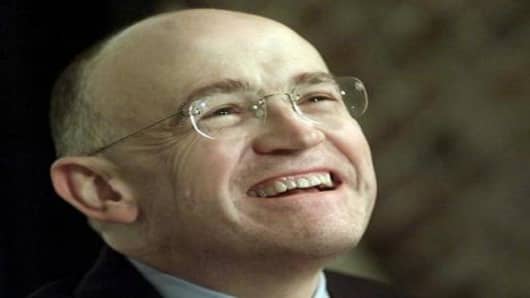At the end of 2009 the outlook was bleak for a whole swathe of British companies as a severe lack of liquidity promised to test all but the best-run firms and push struggling ones to the wall.
Distressed-debt funds readied their war chests and waited for the cracks to appear in corporate balance sheets. Meanwhile, fund manager Jon Moulton was planning a longer-term approach to what he saw as a wave of bankruptcies on the horizon.
He launched a new fund calledBetter Capital, designed to turn around failing companies instead of picking over their assets for scraps.
But the wave of bankruptcies didn't come, at least not to the extent many market watchers expected. The Bank of England kept interest rates at record lows, and continues to do so, while banks proved reluctant to cut the chord.
"There's an awful lot of financially troubled companies being drip-fed money by the banks, staggering along aided by the low interest rates," Moulton said.
Many banks proved willing to go easy on troubled companies in a bid to prevent a fire sale and chalk up more losses to their scrutinized balance sheets, according to Moulton.
"The opportunities we had hoped for in corporate distressed (debt) from the 'wall of maturities' in the next couple of years have definitely been extended out to 2014 and beyond," Michael Chung, head of distressed and special situations at Arrowgrass Capital, told CNBC.com.
Lenient Banks?
Chung agreed that banks were being more lenient than expected, which was limiting the number of liquidations along with the low rates.
But other market observers disagree.
"It doesn't matter what the interest is if you can't actually get any new lending. I think that pressure is beginning to happen right now," Clive Hyman, CEO of Hyman Capital Services said.
Private equity cash is also playing its role in stemming the flow of potential corporate collapses, according to Chung.
"Private equity sponsors are injecting incremental equity to protect 2005 – 2007 vintage LBO (leveraged buyout) investments, and the broader credit markets' recovery is allowing a wave of refinancing," he said.
Regardless of the reasons behind the relatively quiet bankruptcy courts, vulture funds, which specialize in buying up debt in companies at risk of bankruptcy, have seen slim pickings, Hyman agrees.
Long-Term Approach
While distressed debt funds may be left with little but scraps to fight over, Moulton's Better Capital is reaping rewards by taking a long-term approach to fixing debt-ridden companies.
"The distressed debt funds are finding hard times, the turnaround area where we operate is much less populated, it's really quite a small market at the moment," Moulton told CNBC.com.
Since its launch at the end of last year, Better Capital has already looked at around 310 UK companies with some degree of financial trouble for potential deals.
The fund has only currently taken control of four of those companies, competitors have done a couple of deals and around twelve have gone bust, according to Moulton.
The biggest of Better Capital's four acquisitions is that of the UK operations and the Irish software business of Calyx from Anglo Irish Bank. Moulton told CNBC.com the rate of turnaround already generated definitely justified the investments.
Better Capital specializes in finding companies with operating losses, turning them into operating profits and putting them into good order to sell on later, Moulton said. The process rarely takes less than three years and may take as long as five, he added.
"They may have a fairly dodgy balance sheet or poor financial reporting and certainly at the time you buy them, they've very often got lousy management," he said.
The lack of bankruptcies is at odds with his predictions during the fund's beginning. He expected a sharp rise in the number of firms going to the wall, but hadn't expected UK rates to remain low for an extended period.
Even though there may not have been enough failing companies to keep the vulture funds happy, Better Capital has more than enough turnaround work to keep it busy, according to Moulton.
"We've been able to find opportunities which are attractive for the fund and we've been able to deploy money at a pretty reasonable rate," he said.
Reversal of Fortune
Even though the expected wave of failures hasn't yet materialized, a tide change may not be far off and it could rise very rapidly, according to Moulton.
"At some stage interest rates will rise and that wall of financially troubled companies will become financially impossible companies," he said.
Hymen also expects a sharp rise in bankruptcies soon and thinks the liquidity problems are set to fully take hold. A rise in interest rates would just exacerbate the cull, he said.
Better Capital is looking to take advantage of any financial squeeze and has only deployed one quarter of its available capital. Moulton expects the fund to be fully invested by the end of the year.
Chung of Arrowgrass Capital agrees that deals can be made in the current environment.
"There remains plenty of distressed opportunity in the aftermath of the crisis in other areas, such as financials," he said.
Chung spotted opportunities in the liquidation of Icelandic banks, restructuring of financial institutions like Hypo Real Estate, and liability management for other banks' balance sheets, such as Royal Bank of Scotland and Lloyds .
"Furthermore, we see a potential opportunity with increased secondary sale activity of stressed corporate loans from European banks such as RBS and Lloyds as they remain under pressure from regulators to clean up balance sheets," he said.
Hymen stresses the importance of finding a fundamentally sound company when investing in the distressed space.
"The trouble with distressed debt is there's a distress business there. So you have to find a good business which has got some fixable cash-flow challenges," Hymen said.



